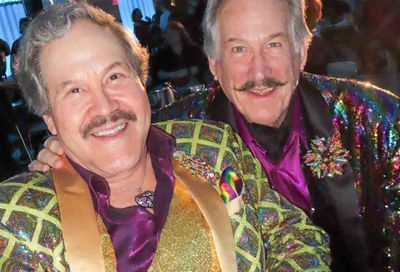Friends and Relations
Commentary: Alphabet Soup
During a recent fundraiser for a local charity at the home of two friends in a long-term lesbian relationship, I found myself concentrating very little on the effort to raise funds. I spent a little bit of time thinking about how lovely my friends’ home has become, and a little bit of time thinking about the items I had bid on in the silent auction.
Most of the time, I was thinking about the strength of the relationship between these women. They aren’t much older than I am, and they’ve been together more than a decade, as long as I can remember knowing either of them. While they’re not in my closest circle of friends, I’ve always enjoyed seeing them around and always wondered what magic kept their relationship so strong.
I wondered what the secret was, and on more than one occasion, I thought of asking them about it.
As it turns out, they’re as human as the rest of us, and their relationship recently came to an end. If there was magic or they were privy to relationship secrets, these items had a shelf life.
My relationship with my partner has lasted just longer than nine years, and while we’re in it for the long haul, our time together hasn’t been without challenges. We’re human too, and at some point we realized the truth about love: Relationships require effort, and they don’t stay as rosy and carefree as they were in the initial days of breezy togetherness.
With this knowledge, I took the news of my friends’ breakup pretty hard. The friend who told me about it was puzzled. I tried to explain that my disappointment had a few different facets: I was sad for them and the difficulty they are likely to experience in transitioning to their new lives apart. I was heartsick because anytime a long-term couple breaks up, it seems like a blow to the institution of love.
But most of all, I was troubled because they were the only couple I knew around my age who’d been together longer than Kim and I have, which made them role models to me.
They also relieved me of an imagined burden of being the lesbian couple who’d been together longer than any other among our peers. I liked knowing that we weren’t by default a pillar of strength in our community, and that the only expectations we had to live up to were our own.
I can report with relief that in the days since I’ve learned of this break-up, I haven’t found myself carrying any illusions of grandeur that suddenly now all of lesbiandom is looking to us for relationship inspiration. I haven’t felt any new stress on our relationship — it’s mostly been the same old stress about whose turn it is to bathe the dog and where we’re going to go on vacation.
Besides, we have other role models, including the couple in our church who announced their 18th anniversary a few months ago. They’re a bit older than we are, but they have a kid and we want to have kids, and they, too, have always made longtime commitment look easy to us. When I congratulated one of them by email after their anniversary announcement, I found myself comforted by the honesty of her response: “It’s a challenge keeping a relationship going…no doubt about it. We’re grateful.”
Further away from my social sphere, I have always admired lesbian activist pioneers Del Martin and Phyllis Lyon, not only for their work to better this world as we know it, but also for the duration of their relationship, now more than 50 years strong.
I have a photograph of myself with Del and Phyllis taken in May 1995 when they were in town for an event that I had interviewed them about by phone for a Washington Blade story. I tagged along with our photographer so I could meet them in person. I remember the month that photo was taken because when I met up with them, I was wrapping up what must have been my third or fourth date with the woman who is now my partner.
I recently learned that as much as I find hope and encouragement — with the occasional heartbreak — in the stories of the lesbian couples whose unions predate the beginning of my relationship, it’s a mistake for me to look only to my partnered pals for lessons in love.
One friend has been particularly important to me recently, helping me weather some tricky emotional terrain. As she and I sat in a grocery store parking lot one recent night and I told her about some of my anxieties that are unrelated to love and marriage, I was naïvely surprised to find her giving me advice I hadn’t heard elsewhere about successfully keeping a relationship afloat.
I had explained to her how worried I was that I was focusing too much on myself and my own needs lately, and shouldn’t I be putting all of this energy into my relationship, especially as we emotionally prepare ourselves for the challenge of trying to start a family?
My friend lovingly told me that by helping myself and by giving Kim space to do some things she needs to do, as long as we continue to communicate, we are working on our relationship and positive growth would come about as a result. She made so much sense, and I felt so encouraged, that for a while I almost forgot that I was receiving relationship counsel from someone who’s been single for a few years now and who doesn’t have a decade-long relationship experience under her belt.
It became suddenly clear: The strength I draw from does not have to be wrapped up in a package labeled “relationship success.” My friends are wise regardless of whether or not they wear a ring, and other friends’ long-term relationships — even after they’ve ended — can and will continue to be a source of inspiration.
Kristina Campbell and her partner are sure to stay together for a long, long time because when they bought their house in Takoma Park, Md., they both swore they’d never move again. “Alphabet Soup” appears biweekly and its author can be reached at kcampbell@metroweekly.com.
Support Metro Weekly’s Journalism
These are challenging times for news organizations. And yet it’s crucial we stay active and provide vital resources and information to both our local readers and the world. So won’t you please take a moment and consider supporting Metro Weekly with a membership? For as little as $5 a month, you can help ensure Metro Weekly magazine and MetroWeekly.com remain free, viable resources as we provide the best, most diverse, culturally-resonant LGBTQ coverage in both the D.C. region and around the world. Memberships come with exclusive perks and discounts, your own personal digital delivery of each week’s magazine (and an archive), access to our Member's Lounge when it launches this fall, and exclusive members-only items like Metro Weekly Membership Mugs and Tote Bags! Check out all our membership levels here and please join us today!





















